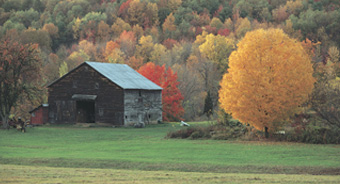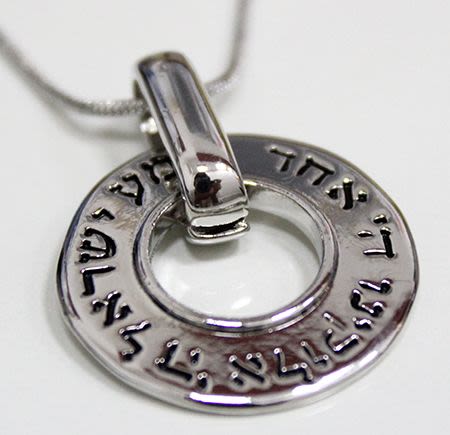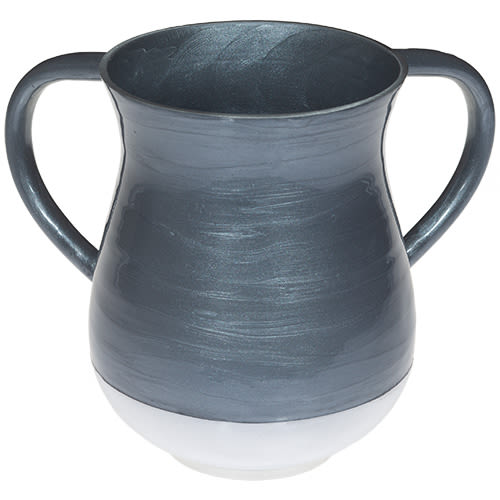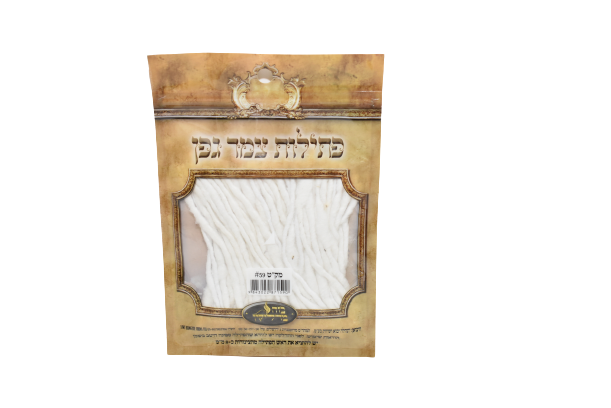
Forest Inn
The Baal Shem yearned again for life in a village, where he could go off by himself and study Torah and worship the Almighty in prayer, in complete solitude…

“The Baal Shem Tov – Early Years”, part 17
In the last episode, the Baal Shem Tov battled and defeated a lion.
A few years went by. The Baal Shem left the village of Koshlevitz and made his home in town of Senitin. Here he formed a "minyan" of his own, a group of Jews who met in his little house of study early every morning, to say the morning prayers ("shacharit") with the rising of the sun. For many, many years this little house of study remained in Senitin, and generations of Jews continued coming there early every morning, to say the morning prayers as the sun rose. And they continued telling wondrous deeds of the Baal Shem Tov, that he performed in the years that he lived there.
In Senitin, the Baal Shem earned his living in a new way. Before a shochet (a ritual slaughterer) or a Jewish butcher bought a kosher animal to have it ritually slaughtered, the Baal Shem would be asked if the animal would turn out to be healthy, and its meat would be kosher to eat, or if something would be found to be wrong with it, and Jews would be forbidden to eat its meat. They found that, amazingly, his answers were always right. And for every animal about which they asked him, they gave him twenty pence.
Soon Yitzchak Dov and Meir, his two devoted pupils, learned that their beloved teacher was now living in Senitin. Longing to see him again, they begged their father to let them travel there, promising to return in a few weeks; and he permitted them to go.
The Baal Shem was overjoyed to see them, and he welcomed them warmly. They saw, however, that he was living in a very poor home, and there were many signs that he was finding it hard to earn enough for his needs. Putting these thoughts aside, however, they asked him to teach them something interesting. For to them, he seemed like an angel, and whatever he taught them they remembered, and thought about it a great deal afterward.
"Remember this well," he told them. "In the Torah we read that 'the wisdom of the unfortunate man is despised. Sometimes a poor man tries all sorts of schemes and clever ideas, full of wisdom, to earn a living, so that he should have enough to keep his family living from day to day – and not all his wisdom and cleverness is of any use. He simply needs the Almighty's help."
From these words of his, the youngsters understood that their teacher was unhappy with what he did in Senitin, showing his 'wisdom and cleverness to the butchers and ritual slaughterers.
In a few weeks, the youngsters took their leave from him and returned home, to keep their promise to their father. As they left, they again exclaimed, "Long live our Rabbi!"
The Baal Shem yearned again for life in a village, where he could go off by himself and study Torah and worship the Almighty in prayer, in complete solitude, with no one to disturb him. He rode off to a village near Kitov, and rented a tavern (an inn), which his wife, Chanah, would be able to manage. "I cannot find completeness," he told her. "I cannot study Torah and worship the Almighty with my whole heart, unless I am all alone in the forest."

In the tall Carpathian mountains he found a cave, which he fitted out as a simple home. He put in a small table and chair, and a lamp; and there he studied Torah for six days of the week, returning home only for the Sabbath. Dressed in white linen clothing, he would spend the Sabbath with his family.
One Friday morning Reb David of Mikolayov came riding along, on his way to spend the Sabbath in Kitov. At the inn he had to stop, however, for an axle of the wagon in which he was travelling had broken, and the driver had to fix it. Reb David went into the inn to say his morning prayers. To his surprise, he found the woman of the house (the Baal Shem Tov's wife, Channah) baking twelve challot, twelve loaves of fine white bread. This was something done only in the homes of very devout men who knew the mystic teachings of "kabbalah."
"For what purpose are you making twelve loaves?" Reb David asked her. "Is your husband a learned man or a great rabbi?"
"No," she said. "He is a plain, simple man. But what of it? I am the sister of Reb Gershon of Kitov, and he always recites Kiddush on Friday night at a table set with twelve loaves. So I follow the same custom in my home."
"But where is your husband?"
"He has gone to tend the sheep in the field. He will be home for the minchah prayer, in the afternoon."
When Reb David returned to his horse-and-wagon, he found that the broken axle would take a long while to fix, and he was not likely to reach Kitov in time for the Sabbath. He paced back and forth, anxious and worried: What sort of Sabbath would he be able to spend here, at this inn? Most likely he would not be able to have anything to eat or drink, because the food was probably not really kosher.
As if reading his mind, the Baal Shem's wife spoke up: "Have no worry, dear sir. You can eat here, with us, on the Sabbath. My husband is a shochet (a ritual slaughterer) and our food is perfectly kosher. Here, have a look at the knife he uses."
Reb David examined the blade, and found that it was perfectly smooth and sharp, as the law requires. He was greatly relieved and happy to know that if he had to stay in this village for the Sabbath, he would be able to have his meals here at the inn.
"We also have a fine mikveh nearby," added the Baal Shem's wife, "a body of clear water where you can immerse yourself to prepare in holiness for the Sabbath."
The wagon indeed could not be repaired before the approach of the Sabbath. Before the time for minchah, Reb David went to the mikveh to immerse himself, then dried his body, put on his Sabbath clothes, and returned to say the afternoon prayers. At the table he saw the woman of the house lighting the Sabbath candles. But where, he wondered, was the master of the house? Why had her husband not come home as yet? Surely it was high time?
It was, however, the custom of the Baal Shem Tov to pray minchah among the trees of the forest, -where he would chant "hodu" – Psalm 107 of the Book of T'hillim – to a melody that he had himself composed. Immediately after minchah he -would begin the prayers to welcome in the Sabbath, although the day was far from ended; and he would spend a long while in these prayers, especially in the prayer of "L'chah Dodi," singing each stanza to a different melody. Only after he had finished his prayers, at great length, would he return home. For generally there was a guest for the Sabbath in his home, and there he felt unable to pray with his own melodies and at his own rate.
As dusk was falling, a breeze flowed between the branches of the trees; and had anyone heard it, it would have seemed a voice singing from the Garden of Eden, in which all the trees joined with this holy man, in ecstasy . . . . "Royal holy Temple . . . . . come forth from amid the ruins. Long enough have you stayed in the valley of tears." The birds of the sky as well, nesting in the thick branches of the trees, seemed to join in this chant to the Almighty, as the sun's last rays darkened and the stars began to appear.
Now a sigh burst forth from his heart, as the Baal Shem Tov continued: "Within you (Zion) the afflicted of my people will shelter . . . . " Long ago, says the Talmud, there lived a sage named Rabbi Hanina ben Dosa. So holy and good was he that the whole world received its food for his sake, by his merit. Let he himself lived for a whole week on a measure of carob fruit. Here now stood the Baal Shem Tov, one of the holiest, most devout men in the world, living a life of privation and suffering. The whole week he made do with a single loaf of bread, almost starving from one Sabbath to the next. Yet here he stood praying for "the afflicted of my people." Few others felt as he did all the pain and suffering of the poor and afflicted Jews in the world.
As he prayed on, he asked the Sabbath itself, which had only just now arrived, to pray with him for the Jewish people; for the Sabbath is the source of all blessings. waken, waken, for your light has come; arise, my light, rouse yourself, utter song; the L-rd's glory upon you is revealed!"
Now, as the forest's shadows wrapped his head in darkness, the holy man prayed, "Spread over us Your shelter of compassion, life and peace…." And when his prayers were over at last, he returned home, to find the Sabbath candles burning and spreading cheer in the room.
"Good Sabbath," he said as he entered; and when he saw that there was a guest, he was filled with happiness. He went over to the guest and gave him a warm welcome with a cheerful face.
"I was waiting for you," said the guest, "so that we could say together the prayers to welcome the Sabbath."
"Good," said the Baal Shem Tov. "Let us pray together." He went to stand at the wall, and pretended to chant the words of the evening prayer, so that his guest should not realize that he had already chanted them.
When there was no guest, it was the Baal Shem Tov's way to sing at great length, with a heartwarming melody of fervor and holy devotion, the words of "shalom alechem," to welcome the angels who accompany a Jew home on Friday evening after his prayers. Then he had a guest, however, he would ask the man to recite it aloud, and he would whisper along, so that the man should notice nothing extraordinary about him.
When the time came for "kiddush," the Baal Shem Tov asked Reb David to chant it, and he would fulfill his own duty by answering Amen. During the meal, between courses, Reb David sang "z'mirot," traditional table hymns, while the Baal Shem kept silent and listened, to give again the impression that he was a simple, ignorant man.
When the meal ended and it was time to say the grace after meals, the host asked his guest to relate some interesting thought from the Torah. "Whatever can I say to such a simple man," mused Reb David in his mind, "that he will understand? I had better tell him about the portion of the Torah that will be read tomorrow morning in the synagogue."
He related how the Hebrew people became enslaved in ancient Egypt, and under conditions of great cruelty they had to do the most difficult, backbreaking work.. The Baal Shem listened with cries of great interest, as if he were hearing of this for the first time.
The bed for the guest was prepared near the stove in the main room, and the Baal Shem Tov and his wife retired to the bedroom. Reb David went to sleep happily. True, he thought, his host was a plain man without any learning; but the man kept the Torah's laws, and it was pleasant to spend the Sabbath here.
In the early hours of the morning he awoke, and saw a great light, like a blazing fire, atop the stove. Leaping out of bed, he seized a pitcher of water, and began running to put out the fire, when he suddenly remembered that it was the holy Sabbath, and what he wanted to do was forbidden. He put the pitcher down and began shouting, "Fire! Fire!"
To be continued next week, G-d willing…
***
Tzvi Meir Cohn attended Yeshiva Hadar Hatorah in Crown Heights, Brooklyn after completing his university studies in Engineering and Law. While studying at the Yeshiva, he discovered a deep connection to the stories and teachings of the Baal Shem Tov. His many books about the Baal Shem Tov can be found in the Breslev Store. He can be contacted at howard@cohnpatents.com.












